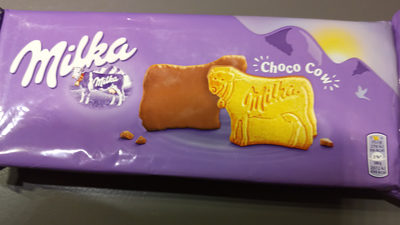
Barcode: 7622300864057
Milka Choco Cow
HALAL
📝 Reason: Most ingredients in Milka Choco Cow are clearly Halal, derived from plant or dairy sources. However, E472e and E476 can be from animal or plant origin, and flavorings are often ambiguous due to lack of sourcing info; these are marked Doubtful as per strict Halal guidelines without clear certification. Refer to IFANCA/foodchemadditives.com and Quran 5:3 for more details.
🏷️ Category: Snacks, Sweet Snacks, Biscuits And Cakes, Biscuits, Chocolate Biscuits, Milk Chocolate Biscuits, Biscuit Cookie Chocolate Covering
📄 Certificates: Vegetarisch
Ingredients:
Details
Understanding the Halal Status of Milka Choco Cow
For many consumers, particularly within the Muslim community, the Halal status of food products is crucial. This post delves into the beloved Milka Choco Cow, a delicious chocolate biscuit that has gained popularity for its rich flavor and delightful texture. The good news is that Milka Choco Cow is classified as HALAL, but let’s break down the reasons and examine its ingredients in detail.
The Ingredients Behind Milka Choco Cow
Milka Choco Cow is made up of a variety of ingredients, most of which are naturally Halal. The main components include:
- Wheat flour: This plant-based ingredient is naturally Halal.
- Sugar: Typically derived from plants, sugar is Halal unless processed with non-Halal media.
- Palm fat: A plant-derived fat, palm fat is also Halal.
- Glucose syrup: Often made from wheat or corn, this ingredient is Halal as long as no Haram processing agents are used.
- Cocoa butter: This product of cocoa beans is Halal.
- Skimmed milk powder: Generally accepted as Halal.
- Cocoa mass: Another derivative of cocoa that is Halal.
- Whey powder (milk): This milk derivative is Halal, provided it comes from Halal slaughtered animals.
- Dairy fat: Coming from milk, dairy fat is Halal.
- Whole milk powder: As a dehydrated milk product, it is Halal.
- Raising agents: Sodium carbonate and ammonium carbonate are both Halal chemical leavening agents.
- Salt: A mineral that is Halal.
- Hazelnut paste: Made from nuts, hazelnut paste is Halal.
- Flavoring: This is often a grey area and requires caution. It can be Halal or Haram, depending on its source, and without detailed information, this ingredient is marked as doubtful.
- Acidity regulator (citric acid): Generally produced from plant-based sugars and is Halal.
The Doubtful Ingredients
While most ingredients in Milka Choco Cow are clearly Halal, two emulsifiers stand out:
- Emulsifier (soy lecithin): This ingredient is Halal.
- E472e and E476: These emulsifiers can originate from animal or plant sources. Their unclear origin means they are marked as doubtful under strict Halal guidelines.
The potential ambiguity surrounding flavorings should also be noted, as they can include non-Halal components, including alcohol or other Haram elements if not sourced correctly.
Certification and Brand Context
Milka is a well-known brand that offers a variety of chocolate products, often appealing to sweet-toothed consumers across the globe. In terms of certification, the product is labeled as ‘Vegetarisch,’ indicating it is suitable for vegetarians. While this does not necessarily confirm Halal status, it does suggest that the ingredients do not include meat or fish derivatives.
Conclusion
In summary, the Milka Choco Cow is categorized as HALAL due to the majority of its ingredients being plant- or dairy-based. However, attention should be given to the emulsifiers E472e and E476 and the flavorings, which might be questionable without clear sourcing information. For those adhering to strict Halal guidelines, it is always advisable to consult with relevant Halal certification authorities or refer to guidelines such as those provided by IFANCA or the Quran (5:3). By doing so, consumers can make informed decisions regarding their snacks while enjoying the delightful taste of Milka Choco Cow.
